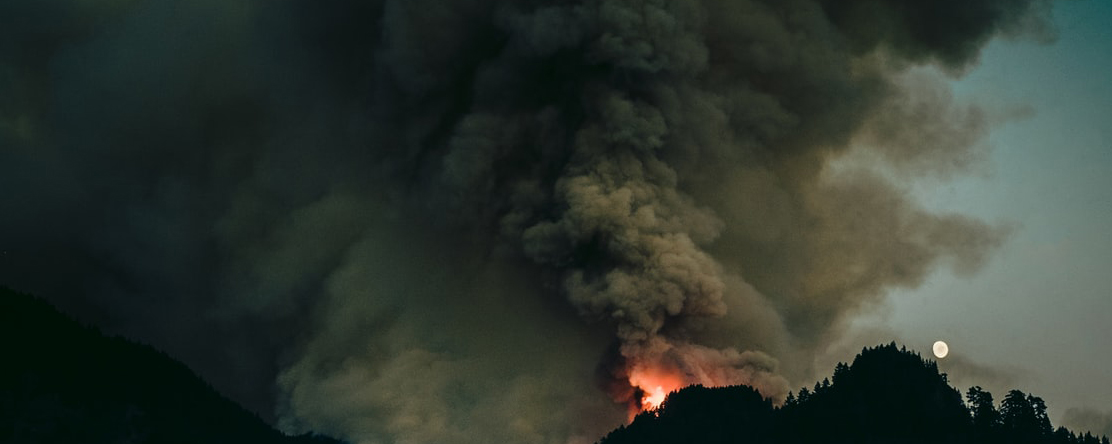
In the News
Short of breath? Chest pains? Smoke-related health impacts from Holy fire felt across Southern California
-
Focus Areas
Environmental Health -
Issues
Asthma, Climate Change, Heart Disease, Wildfires & Extreme Heat -
Programs
Center for Climate Change and Health

Feeling lightheaded or have a nagging headache? Are you short of breath or wheezing?
Maybe your chest is hurting or your eyes are stinging?
Those symptoms could all be from the smoke lingering in the air from the Holy fire, which has burned more than 18,000 acres with effects felt across Southern California. The air was rated “unhealthy” throughout much of Orange, Riverside and San Bernardino counties, according to the South Coast Air Quality Management District.
However, the EPA air quality rankings as of 3 p.m. Friday were showing no areas with the worst scores – “very unhealthy” and “hazardous.”
Tim Sullivan, who lives in Anaheim Hills about 40 miles away from the Holy fire, was surprised when his wife, Bonnie, complained of being short of breath after their regular workout. But then his daughter-in-law in Costa Mesa complained of a sore throat and their 1-year-old son was coughing.
“It probably had something to do with the air,” he said Friday. “You don’t have to have it right above you to feel the effects.”
The Orange County Health Care Agency sent out an advisory warning on health dangers to residents, “especially those in certain high-risk groups.”
“Everyone should take precautions to stay cool and drink plenty of water to reduce health risks related to the heat and wildfire smoke,” said Orange County Health Officer Eric Handler. “Additional precautions are especially needed for older adults, those with preexisting medical conditions like heart or lung disease, those with disabilities, children, and those who may be working outdoors.”
Wildfire smoke is laden with particulate matter, which triggers asthma, worsens lung and heart disease, according to Dr. Linda Rudolph, director of the Center for Climate Change and Health at the Public Health Institute in Oakland.
“The health impacts of wildfire travel long distances: smoke from last year’s Northern California wildfires was detected more than 500 miles away in Mexico,” Rudolph wrote in a July 10 op-ed for the Riverside Press-Enterprise and the Southern California News Group.
Limit the outdoor air
A few ways to reduce the health effects of wildfire smoke include keeping windows and exterior doors closed, and using the air conditioner on the re-circulate mode to limit the intake of outdoor air.
Health agencies also encourage keep your body’s airways moist by drinking extra water, which helps the body filter out potentially harmful particles in the smoke, and avoiding strenuous activity.
“Paper ‘dust masks’ can block large particles, such as sawdust, but do not protect your lungs from the small particles or gases in wildfire smoke,” according to the SCAQMD. “Disposable respirators such as N-95 or P-100 respirators can offer some protection, if they are worn properly and have a tight fit.”
People should seek medical attention if they experience chest pain, chest tightness, shortness of breath or severe fatigue, according to the advisory.
The smoke advisory will be in effect at least through Saturday morning.
Pat Lien, a surfer from Huntington Beach, felt the effects of the smoke after catching waves. He described a winded feeling, a shortness of breath he normally doesn’t feel after his surf sessions.
Joni Elias could feel the impacts of the smoke – in her chest, throat and head – as far away as Hermosa Beach.
Dealing with ash
Sullivan also thought of the environmental impacts the ash in his yard may have. As a surfer, he knew that if he washed it down the storm drain, it would end up in the ocean.
He swept it up — enough to fill half an ice bucket — and then hosed it down lightly with a mist.
“I’m glad I swept it up before I washed it down the drain,” he said. “That’s exactly where it goes, to my front curt and to the gutter, to the drain. You can imagine it going straight to the beach.”
Cleanup of larger quantities of ash should never be done by people who have lung or heart conditions, according to Dr. Cameron Kaiser, Riverside County’s public health officer.
To clean up a larger quantity of ash, wear a tight-fitting respirator mask, gloves, long-sleeved shirts and long pants, Kaiser said. The mask should cover your mouth and nose and seal properly.
Riverside County officials said residents should not begin the cleanup while ash is still falling and the situation is unpredictable, but to wait until conditions improve.
Continue reading the full article in the Orange County Register.
Originally published by The Orange County Register
More Updates
Work With Us
You change the world. We do the rest. Explore fiscal sponsorship at PHI.
Support Us
Together, we can accelerate our response to public health’s most critical issues.
Find Employment
Begin your career at the Public Health Institute.



